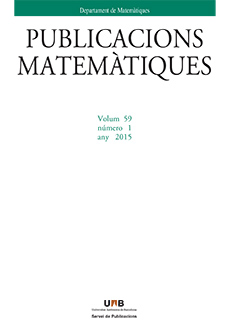Abstract
Let $\Omega$ be a collection of disjoint dyadic squares $\omega$, let $\pi_\omega$ denote the non-smooth bilinear projection onto $\omega$ \[ \pi_\omega (f,g)(x):=\iint 𝟙_{\omega}(\xi,\eta) \widehat{f}(\xi) \widehat{g}(\eta) e^{2\pi i (\xi + \eta) x} \,\mathrm{d} \xi\, \mathrm{d}\eta , \] and let $r>2$. We show that the bilinear Rubio de Francia operator \[ \biggl(\sum_{\omega\in\Omega} |\pi_{\omega} (f,g)|^r \biggr)^{1/r} \] is $L^p \times L^q \rightarrow L^s$ bounded with constant independent of $\Omega$ whenever $1/p + 1/q = 1/s$, $r'\lt p,q \lt r$, and $r'/2 \lt s \lt r/2$.
Citation
Frédéric Bernicot. Marco Vitturi. "Bilinear Rubio de Francia inequalities for collections of non-smooth squares." Publ. Mat. 64 (1) 43 - 73, 2020. https://doi.org/10.5565/PUBLMAT6412002
Information





